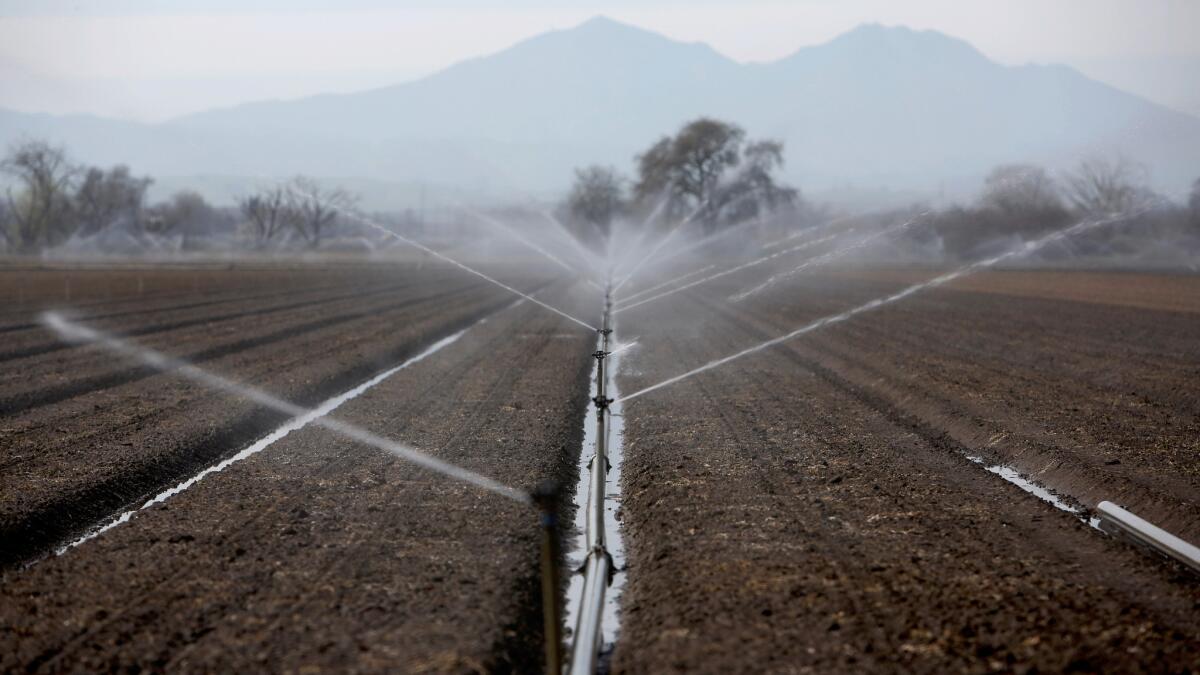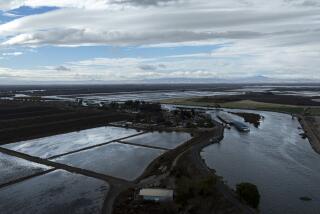Proponents planning a redo of stalled water-train initiative

Backers of a controversial ballot measure intended to shift billions of dollars in state bond money from high speed rail to water storage projects say they will rewrite the stalled initiative in an effort to gain broader support.
The original proposal, despite receiving hundreds of thousands of dollars from conservative and corporate agriculture interests, fell short of its money-raising goals and divided Central Valley growers.
The measure has been promoted as a means of redirecting money earmarked for California’s proposed bullet train.
But it is fundamentally about water and would amend a key clause of the state constitution and direct more than $10 billion in taxpayer money to water-storage projects sought by agri-business — particularly farmers on the west side of the San Joaquin Valley, where drought and environmental restrictions have slashed the region’s irrigation deliveries.
Supporters hoped to take advantage of drought-driven water concerns and the public’s dwindling enthusiasm for the $64-billion bullet train project that would connect Southern California and the Bay Area.
They ran into opposition on several fronts, however, with some critics calling it a badly written attempt to weaken state environmental protections.
The measure’s backers were originally aiming for the November ballot but, in the spring, decided to wait until 2018 to put it before voters. Still, they continued to raise money and collect signatures to qualify the existing language by a July 25 deadline.
It soon became clear that the effort would fall short. On July 1, they announced that they plan to start over again next year with revised language and a fresh signature-gathering campaign.
If they want to try a different path, we’d welcome working with them on it.
— David Guy, president of the Northern California Water Association of Sacramento Valley water suppliers
The delay will allow the initiative’s proponents another shot at raising money, said Anthony Azevedo, a board member of the California Water Alliance, the farm group behind the initiative.
Rewriting the initiative could attract broader support, he said.
Growers in the Sacramento Valley and the east side of the San Joaquin Valley, for example, worry that the measure as written would undermine their chances of getting reservoir money from a 2014 water-bond funding that a state commission is getting ready to spend.
Environmentalists, meanwhile, see the constitutional amendment as an effort to put fish and wildlife at the end of the water line. And legal experts say the language is so confusing, it will spark endless litigation.
“It’s going to be a big mess if it passes,” said UC Berkeley environmental law professor Holly Doremus.
It’s going to be a big mess if it passes
— UC Berkeley environmental law professor Holly Doremsus, discussing the measure as currently written
Aubrey Bettencourt, the water alliance executive director, said it was too soon to know how the measure will be revised, or if the constitutional amendment will be dropped. Her group hopes to work with people who had concerns, she said.
“We’re going to start with the language we have and work from there.”
As now worded, the initiative would amend Article X of the California Constitution to make the state’s highest priority water uses domestic and irrigation.
Though the state Water Code has long done that, attorneys said putting it in the constitution could bolster legal challenges to state requirements for environmental flows in the Sacramento-San Joaquin Delta and rivers that supply the Central Valley.
“It could be a whole new ballgame,” said Craig Wilson, a former chief counsel of the State Water Resources Control Board. “It could change the mandate of the water board from having to balance all the different reasonable uses.”
The initiative would move $8 billion of voter-approved rail bond money to reservoir and groundwater storage projects and take the $2.7 billion earmarked for storage in the 2014 bond, which was approved by voters as Proposition 1.
In the process, the proposal would drop Prop. 1 spending criteria that stipulates that state funds can only pay for the public benefit portions of new storage — such as flood control, recreation and providing water for ecosystem improvements.
They want taxpayers to subsidize private benefits for their earmarked projects
— Doug Obegi, staff attorney, Natural Resources Defense Council
Initiative proponents say the additional storage would supply water for the environment. But the initiative suggests otherwise. One section specifies that water deliveries from the new facilities “shall only be made if their primary purpose” is for domestic and irrigation use.
“They want taxpayers to subsidize private benefits for their earmarked projects,” argued Doug Obegi, a staff attorney for the Natural Resources Defense Council, an environmental group.
Despite endorsements from Congressman Devin Nunes, R-Tulare, and the California arm of Americans for Prosperity, the Koch-brothers backed nonprofit, the initiative campaign raised only about half the $2 million it had budgeted for at the beginning of the year.
Many of the biggest contributions came from conservative donors and well-known farming operations on the San Joaquin Valley’s west side, including growers with land in the sprawling Westlands Water District.
Azevedo, partnerships in the Stone Land Co. — where he is the farm manager — and Stone Land contributed a total of $138,500 to the initiative campaign, according to the state Fair Political Practices Commission.
About 7,000 acres of Stone Land’s 10,000 acres is in Westlands. As one of the last big districts to join the federal Central Valley Project, Westlands is among the first to suffer when south-of-the delta deliveries are cut due to drought or state and federal environmental restrictions.
“I’m living it,” Azevedo said. “I don’t have enough water to farm with. I have 1,500 acres of our ranch that is not being farmed right now.”
I don’t have enough water to farm with. I have 1,500 acres of our ranch that is not being farmed right now.
— Anthony Azevedo, California Water Alliance board member
The top single initiative donor, according to state campaign records, is Forrest Lucas, who contributed $100,000 last month. The co-founder of Lucas Oil Products, a Corona-based company that makes lubricants and additives, he owns a large Missouri cattle ranch and lives in Indiana.
Lucas, who did not respond to interview requests, also founded Protect the Harvest in 2014. One of that organization’s missions, according to its website, is to “respond to the activities of radical groups by opposing their efforts to pass laws or enact regulations that would restrict our rights, limit our freedoms, and hinder our access to safe, affordable food.”
Bettencourt, whose family farms on the San Joaquin’s Valley west side, is on the board of America’s Food Security Foundation, which donated $45,000 to the initiative.
The foundation is part of Ag America, a coalition dedicated to electing public officials with “a proven record of supporting American agriculture through the application of commonsense free market principles at all levels of government,” according to the website.
David Guy, president of the Northern California Water Association of Sacramento Valley water suppliers, which opposed the initiative, said his group is willing to sit down with the alliance.
“It was just unfortunate the way this kind of evolved,” he said. “If they want to try a different path, we’d welcome working with them on it.“
bettina.boxall@latimes.com
Twitter: @boxall
More to Read
Start your day right
Sign up for Essential California for news, features and recommendations from the L.A. Times and beyond in your inbox six days a week.
You may occasionally receive promotional content from the Los Angeles Times.







